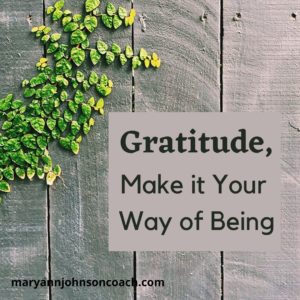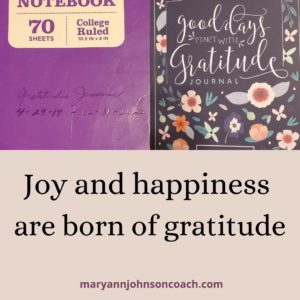Gratitude begins with attitude.
 Gratitude is a choice not based on what is happening to us, what we have or don’t have, but on how we choose to see what is happening to us. Regardless of our circumstances, we all have much to be grateful for if we pause and contemplate our blessings.
Gratitude is a choice not based on what is happening to us, what we have or don’t have, but on how we choose to see what is happening to us. Regardless of our circumstances, we all have much to be grateful for if we pause and contemplate our blessings.
We can lift ourselves and others, as well, when we refuse to remain in the realm of negative thought and cultivate within our hearts an attitude of gratitude. If ingratitude is one of the grave sins, then gratitude takes its place among the noblest virtues. The Roman philosopher, Cicero, said, “Gratitude is not only the greatest of virtues but the parent of all others.”
Dr. Robert Emmons, a professor at the University of California, Davis, and one of the leading scholars in the scientific study of gratitude, said the following: “It is possible that psychology has ignored gratitude because it appears, on the surface, to be a very obvious emotion, lacking in interesting complications: we receive a gift—from friends, from family, from God—and then we feel pleasurably grateful. But while the emotion seemed simplistic even to me as I began my research, I soon discovered that gratitude is a deeper, more complex phenomenon that plays a critical role in human happiness. Gratitude is literally one of the few things that can measurably change people’s lives.”
The other day after a church meeting, someone said to me, “I am so inspired.” In my heart, I responded, “Inspired to what end.” It isn’t enough to be inspired. We must be moved to action. I want to help you decide to move to a more significant place of gratitude. I recognize that we are all in different places in our lives, and so I have created a varied list of ten possible action steps that you can use to cultivate more gratitude and, as a result, greater happiness.
Your job is to be open to the action step that will work best for you right now. Don’t pick the one that you think sounds the most righteous or what you think other people will decide. Listen to your inner voice, which one will make the most difference right now, for you.
Ten Gratitude Exercises
1. Come up with some Happiness commandments – After I read Gretchen Rubin’s, The Happiness Project – I asked myself what makes me the most unhappy, and then I came up with three commandments for myself. I post them where I can see them and am reminded of what kind of thinking leads me to happiness.
• Be a Pollyanna
• Clean the ditch (remove garbage thinking)
• Let go of suffering (yes, suffering is a choice)
2. A Gratitude Journal – Dr. Emmons and his colleagues found scientific proof that people who practice gratitude through activities such as keeping a gratitude journal are more loving, forgiving, and optimistic about the future.
They exercise more frequently, report fewer illnesses, and generally feel better about their lives. In subsequent studies, Dr. Emmons also noted that people who regularly kept a gratitude journal and were in the habit of recognizing and expressing gratitude for their blessings reported feeling closer and more connected to people, had better relationships, were more likely to help others, felt less lonely, felt less depressed, slept better, and were more pleasant to be around.
In her book, The How of Happiness: A Scientific Approach to Getting the Life You Want, Sonja Lyubomirsky wrote, “The practice of gratitude is incompatible with negative emotions and may actually diminish or deter such feelings as anger, bitterness, and greed.”
3. Journaling – This is like the gratitude journal, but in this case, detail in writing, one positive experience each day. Journaling will help you find meaning in the activities of the day, rather than just noticing the task itself.
4. Dedicate a few prayers a week to only Gratitude – Ask for nothing; be grateful for what you already have.
• If you can’t walk – do you have a wheelchair
• If you can’t see – can you hear
• If you feel you are too old – you are yet alive and can serve
• If you don’t feel accepted – you have the opportunity to reach out to others
• If you are single and alone, thank God for the family and friends you have
• If you’re having trouble with your spouse, thank God for the opportunity to develop more Christ-like traits through forgiveness and taking personal responsibility
• Thank God for His goodness to you
• Express thanks for Jesus’s example, for His teachings, for His outreaching hand to lift and help, for His
infinite Atonement.
• Thank God for leaders and teachers
• Thank God for your family and children
5. Control negative thinking – Ray L. Huntington, a professor at BYU, said, “Studies have shown that focusing on the negative in times of adversity—using derogatory or critical words as we talk to ourselves or others—can darken our mood and, much like a virus, infect the moods of those we interact with. Consciously choosing to fill our minds with thoughts of our blessings and feeling appreciation for those blessings can change the way we feel and brighten our spirits during difficult times.”
6. Add More Thank-Yous to Your Vocabulary – Saying “thank you” to someone brightens your day by affirming your positive feelings. It also lifts the spirits of those who are deserving of your thankfulness. Use people’s names who check you out at the grocery store, people who help you on the phone, and anywhere else you happen to be and see a name tag. Tell them, ‘thank you.’ Thank your spouse and children for what they do, no matter how small.
7. Take Time to Write Thank-You Notes and Letters of Appreciation – John Kralik, an attorney with a struggling law practice and personal family problems, determined to reverse the cycle of negative thinking through writing and sending one thank-you note each day of the year—365 thank-you notes in total. His note-writing endeavor taught him a valuable lesson: blessings can be easily overlooked unless we are consciously thinking about them each day. To that end, note writing helps us identify, remember, and express our blessings.
8. Live in the Present Moment and Give Thanks for Small Blessings – I call it Being Present – It is easy to get caught up in tomorrow: what needs to be cleaned, shopping to do, the upcoming holidays. And while it’s healthy to plan and prepare for future events, if you are too consumed with tomorrow, there is a chance that you will miss something small and wonderful that is happening to you in the present moment.
9. Random Acts of Kindness – Return the shopping cart to the stall, smile at people, pick up something someone has dropped, tell someone how nice they look, even perfect strangers, move over, and let someone sit down by you.
10. Philanthropy – Learn to give no matter how much you have. Give a dollar or two. If you have more, give more. Do it outside of your tithing and church contributions. The act of being able to give helps you feel well off and increases feelings of gratitude.
For a time, I felt that I should have cards with a small amount of money in my car. I was impressed to write, “No matter what has brought you to where you are, I care about you, and so does God.” When I saw someone on the street and felt that I should, I would give them a card. I put $50 in a savings account every month so that I could provide these cards. Remember that these were directions to me, and if you ask, you will receive your own guidance on how to serve financially, and it will probably be different from mine.
Take a few minutes right now and think about these ten tools to increase gratitude. Which one speaks to your heart? Choose one.
Now that you have chosen something that you will do this coming year to increase your gratitude, and ultimately your happiness, let me share two quotes.
First, from Melody Beattie, author of The Language of Letting Go: Daily Meditations on Codependency, ” Gratitude unlocks the fullness of life. It turns what we have into enough and more. It turns denial into acceptance, chaos to order, confusion to clarity. It can turn a meal into a feast, a house into a home, a stranger into a friend. . .Gratitude makes sense of our past, brings peace for today, and creates a vision for tomorrow.”
And from David Steindl-Rast, a Benedictine monk who penned these beautiful words: “The root of joy is gratefulness. It is not joy that makes us grateful; it is gratitude that makes us joyful.”
If these words have inspired you, I would ask, “To what end have you been inspired?” Commit to yourself that you will practice Gratitude and make it your way of being.


 Some years ago, I decided to find out what I could do to improve my life the most.
Some years ago, I decided to find out what I could do to improve my life the most.